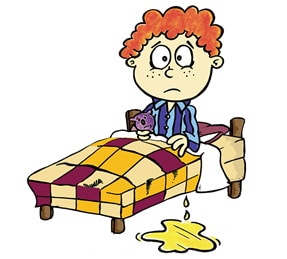
Nocturnal Enuresis (bedwetting) for Children
Nocturnal Enuresis (bedwetting) for Children
Prof. Dr. Magdi Dahab
Consultant Neurologist
United Doctors Hospital
Did you know, dear reader, that there are 50 million children around the world who suffer from bedwetting and that 15-20% of those aged five and 5% of those aged ten suffer from bedwetting, which is known as nocturnal enuresis or bed wetness, although the child has exceeded the age that is supposed to be able to adjust bladder emptying during sleep. This condition affects both genders, although the incidence rate in males exceeds that in females by 3:2, which makes the child introverted and shy, and may become the subject of ridicule or reproach for something he has no will in, but often refrains from participating in fun and useful activities such as trips, scout camps and visiting relatives to spend a night with them.
There are many questions that parents ask when consulting a doctor, including:
Is deep sleep the cause?
It is noticeable that many parents see that their affected children fall into a deeper sleep compared to the rest of their siblings, but studies conducted on these children have confirmed that their sleep stages are normal, although waking these children is more difficult than waking up others.
Is it a genetic disease?
There is a clear relationship between bedwetting and heredity, as studies have confirmed that 75% of affected children have a family member (parents, siblings, relatives) who has bedwetting.
Is it a mental illness?
Studies have not proven that bedwetting is the result of stress or psychological disorders, but it was found that in the case of treating the problem, the child gains back self-confidence, as he becomes happier and even improves his performance in school compared to the period of the problem, which confirms that those affected are under psychological pressure due to the disease and not vice versa, and there is recent research that indicates that the child’s lack of security may increase the rate of nocturnal enuresis and this comes as a result of a defect in the triple relationship between Father, mother and child.
Is it due to a malfunction of the bladder?
In most cases, the functioning of the bladder is normal in affected children, and in children with bedwetting at first, the kidney and ureter are normal and no tests are required to confirm this, but of course there are some diseases whose symptoms are nocturnal enuresis, such as urinary infections and neurological bladder disorders.
So what is the main cause?
This is due to the understanding of the physiology of bedwetting, in a normal child there is a permanent balance between the amount of urine produced at night and the capacity of the bladder, which enables the child to sleep throughout the night without the need to go to the bathroom, but in affected children, urination occurs as a result of increasing the amount of urine produced at night to an extent that exceeds the capacity of the normal bladder to absorb it, so urine comes out involuntarily during the child’s sleep.
Can an affected child control the disease?
This disease has causes that the child cannot control, as well as has nothing to do with the child’s actions or behavior, so it is very important to deal with it on this basis, and therefore he should not be scolded, punished or ridiculed in the case of bedwetting, as this may increase the psychological pressure on the child, which leads to difficulty in treatment.
What are the negative effects of bedwetting?
The main negative effects are psychological pressure on the child and his sense of inferiority from others, especially that he cannot practice some social activities such as traveling or sleeping with relatives and friends, and this may lead to a decrease in the child’s creativity and even isolation, and often these symptoms disappear and the child’s psychology improves immediately after treatment.
When is it better to consult a doctor?
There are 5 situations in which we should consult a doctor:
- If the child reaches the age of five and is still suffering from bedwetting.
- If the child is very upset about the problem and has not yet reached the age of five.
- If there are symptoms of lack of urine control during the day or the presence of urinary infections.
- If the child is being punished for this problem.
- If a period of time has already passed without the problem and then the same problem has returned again.
Remember:
- The problem should not be left for a long time unresolved, as with age, psychological pressure increases and with it the difficulty of solving the problem increases.
- Never punish or abuse your child for a reason beyond his control, but support him because encouraging him helps the treatment work.
- There is a drug preparation given just before bedtime and restores the natural balance between the amount of urine produced at night and the size of the bladder, so the child remains dry throughout the night, so we have to see the doctor to see the talk in the treatment of such cases.




